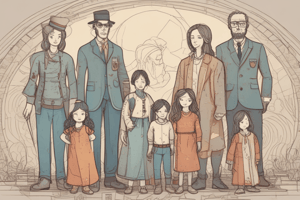Podcast
Questions and Answers
What is the primary characteristic of a nuclear family?
What is the primary characteristic of a nuclear family?
- Relationships between grandparents, aunts, uncles, and cousins
- Relationships between parents and their dependent children (correct)
- Relationships between parents, children, and other relatives
- Relationships between biological and non-biological children
What is emotional intimacy in the context of family relationships?
What is emotional intimacy in the context of family relationships?
- Teaching children values, norms, and skills necessary for social integration
- Providing emotional, physical, and financial support to family members
- Financial support provided by family members
- Close, personal relationships characterized by emotional support and trust (correct)
What is a key aspect of family systems theory?
What is a key aspect of family systems theory?
- The view of the family as an interconnected system (correct)
- The emphasis on social learning through observation
- The formation of emotional bonds between family members
- The focus on individual family members' behaviors
What is a common challenge in family relationships?
What is a common challenge in family relationships?
What is a key aspect of attachment theory in the context of family relationships?
What is a key aspect of attachment theory in the context of family relationships?
What is a characteristic of a blended family?
What is a characteristic of a blended family?
What is a key role of family members in terms of socialization?
What is a key role of family members in terms of socialization?
What is a potential benefit of conflict in family relationships?
What is a potential benefit of conflict in family relationships?
Flashcards are hidden until you start studying
Study Notes
Family Relationships
Types of Family Relationships
- Nuclear Family: Relationships between parents and their dependent children.
- Extended Family: Relationships between parents, children, and other relatives such as grandparents, aunts, uncles, and cousins.
- Blended Family: Relationships between parents and their biological and non-biological children (e.g., step-siblings).
Characteristics of Family Relationships
- Emotional Intimacy: Close, personal relationships characterized by emotional support and trust.
- Interdependence: Family members rely on each other for emotional, financial, and practical support.
- Commitment: Long-term dedication to one another, often involving sacrifices and compromises.
Family Roles and Responsibilities
- Caregiving: Providing emotional, physical, and financial support to family members.
- Socialization: Teaching children values, norms, and skills necessary for social integration.
- Financial Support: Sharing financial resources and responsibilities within the family.
Challenges in Family Relationships
- Conflict: Disagreements and arguments between family members, which can be beneficial for growth and understanding if resolved healthily.
- Communication Breakdown: Inadequate or ineffective communication leading to misunderstandings and resentment.
- Generational Differences: Conflicts arising from differing values, beliefs, and cultural norms between generations.
Theories of Family Relationships
- Family Systems Theory: Views the family as an interconnected system, emphasizing the interdependence of family members.
- Social Learning Theory: Suggests that family members learn behaviors, attitudes, and values through observation and interaction.
- Attachment Theory: Focuses on the formation and maintenance of emotional bonds between family members, particularly between parents and children.
Family Relationships
Types of Family Relationships
- A nuclear family consists of parents and their dependent children, forming a basic family unit.
- An extended family includes parents, children, and other relatives, such as grandparents, aunts, uncles, and cousins, extending beyond the nuclear family.
- A blended family is a family with parents and their biological and non-biological children, such as step-siblings, resulting from remarriage or re-partnering.
Characteristics of Family Relationships
- Emotional intimacy in family relationships is characterized by close, personal bonds and emotional support.
- Interdependence in family relationships involves reliance on each other for emotional, financial, and practical support.
- Commitment in family relationships involves long-term dedication, often requiring sacrifices and compromises.
Family Roles and Responsibilities
- Caregiving in families involves providing emotional, physical, and financial support to family members.
- Socialization in families teaches children values, norms, and skills necessary for social integration and development.
- Financial support in families involves sharing resources and responsibilities, ensuring economic stability and security.
Challenges in Family Relationships
- Conflict in families can be beneficial for growth and understanding if resolved healthily and constructively.
- Communication breakdowns in families lead to misunderstandings, resentment, and unresolved conflicts.
- Generational differences in families can cause conflicts arising from differing values, beliefs, and cultural norms.
Theories of Family Relationships
- Family Systems Theory views the family as an interconnected system, emphasizing the interdependence of family members and the impact of individual actions on the entire system.
- Social Learning Theory suggests that family members learn behaviors, attitudes, and values through observation, imitation, and interaction with each other.
- Attachment Theory focuses on the formation and maintenance of emotional bonds between family members, particularly between parents and children, and their impact on development and relationships.
Studying That Suits You
Use AI to generate personalized quizzes and flashcards to suit your learning preferences.




